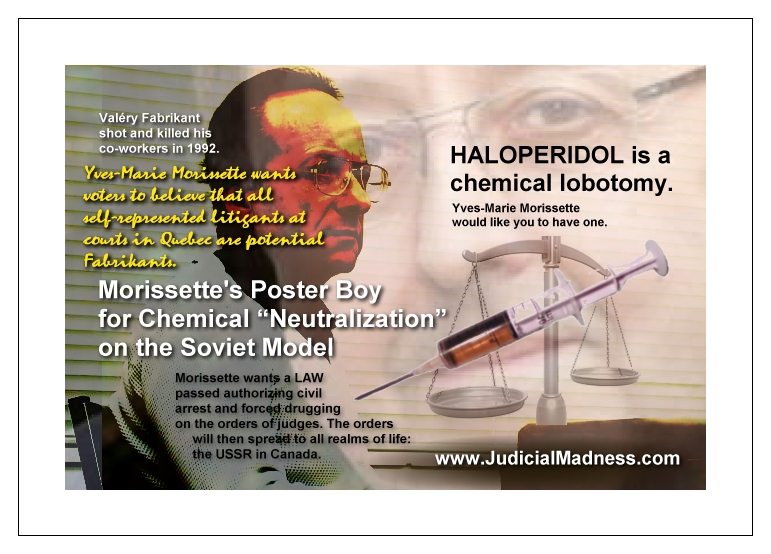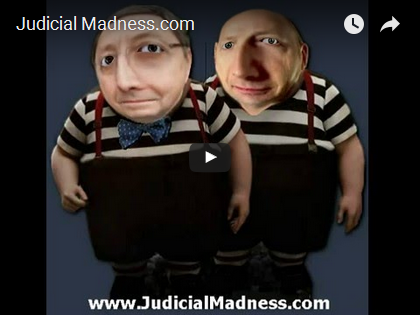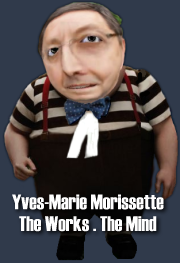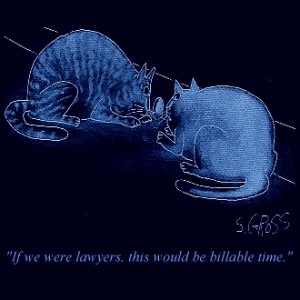Favorite Quotations of “JudicialMadness”
Favorite Quotations
The social tyranny of extorting recantation, of ostracism and virtual outlawry as the new means of coercing the man out of line, is the negation of democracy.
― Justice Ivan Cleveland Rand of the Supreme Court of Canada, Canadian Bar Review (CBR)
Les circonstances qui contraignaient Voltaire à chercher un refuge chez nos voisins devaient lui inspirer une grande sympathie pour des institutions où il n’y avait nulle place à 1′arbitraire. ‘La raison est libre ici et n’y connaît point de contrainte.’ On y respire un air plus généreux, on se sent au milieu de citoyens qui n’ont pas tort de porter le front haut, de marcher fièrement, sûrs qu’on n’eût pu toucher à un seul cheveu de leur tête, et n’ayant à redouter ni lettres de cachet, ni captivité immotivée.”
― Gustave Desnoiresterres, Voltaire et la société au XVIII siècle, i. p. 365, cité par Albert Venn Dicey
I by no means undervalue the importance of making the decisions of courts intelligible to those who have not made a special study of law …
― Judge Ramsay, writing in, writing in ex parte Dansereau, 19 L.C.J. 210 (1875)
In 1725 Voltaire, then the literary hero of his country, was lured off from the table of a Duke, and was thrashed by lackeys in the presence of their noble master; he was unable to obtain either legal or honourable redress, and because he complained of this outrage, paid a second visit to the Bastille. This indeed was the last time in which he was lodged within the walls of a French gaol, but his whole life was a series of contests with arbitrary power, and nothing but his fame, his deftness, his infinite resource, and ultimately his wealth, saved him from penalties far more severe than temporary imprisonment. Moreover, the price at which Voltaire saved his property and his life was after all exile from France.
― Albert Venn Dicey, Introduction to the Study of the Law of the Constitution, Eighth Edition, Oxford, 1914
What is more depressing is that the country returned to political repressions. We have today, a couple of dozens of political prisoners, again. Which I thought would never happen in my lifetime.
Even more than that, at a certain point, the psychiatric use for repressions was returned again. And that was by far the most depressing news for me. I thought we buried that method of repression forever. And yet, it did happen again. Several cases. Luckily, we managed to stop it in time, but we cannot guarantee it would not be renewed tomorrow.
― Vladimir Bukovsky, Former Soviet Political Dissident, speaking on The Power of Memory and Acknowledgement, Distinguished Lecture, Tuesday, October 13, 2009 for the Cato Institute
The worst scenario which one could have imagined twenty years ago, could be observed in Russia. What we see there is a march backwards, I would say. Some kind of revisionism. Some kind of restoration process is going on there. … For them, for the people who came to power with him – and they are predominantly KGB people – the most important thing is to restore as much as possible all the Soviet system.
― Vladimir Bukovsky, Former Soviet Political Dissident, speaking on, The Power of Memory and Acknowledgement, Distinguished Lecture, Tuesday, October 13, 2009 for the Cato Institute
A system which has murdered 20 million of its own people (50 million, if the loss of life in China under Communism is included), which has raped its intellectuals, and which has brought suffering and misery to the peoples of the Soviet Empire, does not deserve to be renewed. The American people are under no moral obligation to help with the resurrection of such a plainly evil system. The pragmatic basis for a revised US response to ‘perestroika’ is the need to protect and preserve the American system from ‘restructuring’ preparatory to ‘convergence’ with the ‘reformed’ Soviet system, and to save the American people from the blood baths and re-education camps which such ‘convergence’ will eventually bring about, of which the West currently has no conception.
― Anatoliy Golitsyn writing in “Postscript: The Long-Range Deception Strategy”, p. 209 in The Perestroika Deception, 1995.
It [the Long-Term Strategy] sees it, not only as a renewal of Soviet society, but as a global strategic design for ‘restructuring’ the entire capitalist world.
― Anatoliy Golitsyn writing in “Postscript: The Long-Range Deception Strategy”, p. 209 in The Perestroika Deception, 1995, p. 17.
It was during 1958-60 that the Communist leaders envisaged the convergence of restructured and transformed capitalist systems leading ultimately to one system of World Government.
― Anatoliy Golitsyn writing in “Postscript: The Long-Range Deception Strategy”, p. 209 in The Perestroika Deception, 1995, p. 12.
By failing to see the symptoms of an approaching sickness, we condemn ourselves to the necessity to confront evil on a large scale instead of nipping it in the bud. Consequently, we often lose such fights. We are always late, when it is no use crying over spilt milk anymore. National traits, however, are neither fatal nor everlasting. Our destiny is in our hands. We should just pay more attention to things that at first glance appear unimportant.
― Alexander Podrabinek, writing in, “Soviet Forever”, published on the 10th of April 2013 by the IMR Institute of Modern Russia in its Analysis category.
The future does not allow us to simply copy the past. That is why they so often and so cautiously talk about modernization, innovations, new objectives, and conformity with the times. On the face of it, these notions sharply contradict their retrograde practices, but in reality, there are no contradictions here. They are trying to adapt Soviet totalitarianism to the twenty-first century. They are looking for ways to achieve this end. Their task is difficult, and we have plenty of opportunities to prevent them from fulfilling it.
― Alexander Podrabinek, writing in, “Soviet Forever”, published on the 10th of April 2013 by the IMR Institute of Modern Russia in its Analysis category.
In a democratic country, we all have a right to protect our civil liberties. Often litigants lack knowledge, have no idea of procedures, and are misled by authorities who have a vested interest in protecting themselves. To label this behaviour as an ‘abnormality’ or something that requires psychiatric intervention is ludicrous.
― Dr. R. Pal, “In defence of complainants”, The British Journal of Psychiatry Jul 2004, 185 (2) 175-176; DOI: 10.1192/bjp.185.2.175-a
The diagnosis of querulous paranoia runs the risk of misuse by those who wish to use psychiatry as a manner of silencing criticism.
― Dr. R. Pal, “In defence of complainants”, The British Journal of Psychiatry Jul 2004, 185 (2) 175-176; DOI: 10.1192/bjp.185.2.175-a
Querulous paranoia is a diagnosis best left within the darkened past of psychiatry – perhaps pre-war Russia where Stalin often used ‘madness’ to silence his critics. Genetically, we are all ‘different’ by nature and react in various ways to injustices. It is essential to maintain the civil right to seek a remedy without interference from psychiatry.
― Dr. R. Pal, “In defence of complainants”, The British Journal of Psychiatry Jul 2004, 185 (2) 175-176; DOI: 10.1192/bjp.185.2.175-a
There is a minority of serial complainants but the difference is to ascertain whether their complaints have merits or not. A psychiatrist cannot assess this fairly. Without an independent legal assessment, any person who attempts to fight or campaign for their civil liberties runs the risk of being labelled with a psychiatric illness. Their credibility will often be substantially affected. This, indeed, may be a rather convenient way of silencing uncomfortable critics of negligent authorities. This was not what psychiatry was meant for and neither should it risk going down that route [...]
― Dr. R. Pal, “In defence of complainants”, The British Journal of Psychiatry Jul 2004, 185 (2) 175-176; DOI: 10.1192/bjp.185.2.175-a
Fears are mounting that the psychiatrist Anatoly Koryagin is near to death in the notorious jail of Christopol in central Russia. Letters that have reached the West from his wife and a friend indicate that he is so weak that unless he is given expert medical care he could die at any time.
Dr. Koryagin has been in prison for the last four years for actively opposing the political abuse of psychiatry. The abuse takes the form of labeling dissidents as mad and forcibly treating them with drugs in mental hospitals.
― Peter B. Reddaway, “The Case of Dr. Koryagin”, October 10, 1985 issue of The New York Times Review of Books
As for me, I say that the solution must be extra-judicial because Ebert will ask permission to present himself at the courthouse 150 times. As long as he is not treated or neutralized by a measure still more radical than that, he will continue to do what he has done for years.
― Yves-Marie Morissette, interviewed by Myriam Jézéquel in “Ontologie de la quérulence” (The Ontology of Querulousness), for the Journal du Barreau (Quebec Bar Review) of 1 May 2002, Volume 34, Number 8.
Moi, je dis que la solution doit être extra-judiciaire parce que Ebert va demander 150 fois la permission de se présenter au palais de justice. Tant qu’il n’aura pas été soigné ou neutralisé par une mesure encore plus radicale que celle-là, il continuera de faire ce qu’il fait depuis des années.
― Yves-Marie Morissette, interviewé par Myriam Jézéquel, chercheure, dans “Ontologie de la quérulence” pour le Journal du Barreau du 1 mai 2002, volume 34, numéro 8.
In the last two years there’s been a sharp decrease in the number of judicial trials that have led to the committal to “ordinary” or “special” (i.e. high-security) psychiatric hospitals of healthy, or perhaps unhealthy, citizens, on political grounds. That there are fewer trials no one, I think, will dispute. But at the same time, there are still many people in the ordinary psychiatric hospitals.
― Alexander Podrabinek, speaking in An Address to the Psychiatric Community, being remarks made by Alexander Podrabinek on videotape in Moscow, aired on October 14, 1988 at a symposium of the International Association on the Political Use of Psychiatry held in Washington, DC, translated by Andrew Meier.
There may be some positive features here from the legal point of view. But such positive legal features existed before as well. For example, in the old directives governing psychiatric hospitalization there was a clause stipulating that anyone forcibly committed to a psychiatric hospital must be examined by three psychiatrists within a twenty-four-hour period. In theory this is not a bad idea. It wouldn’t be a bad idea in a lawful country. Unfortunately, the Soviet Union is not that kind of country. The laws here have always been broken. And they continue to be broken today. In a country where the law is subordinated to ideology, it’s a tradition to break them.
― Alexander Podrabinek, speaking in An Address to the Psychiatric Community, being remarks made by Alexander Podrabinek on videotape in Moscow, aired on October 14, 1988 at a symposium of the International Association on the Political Use of Psychiatry held in Washington, DC, translated by Andrew Meier.
Le ministre a déposé, durant nos travaux, un certain nombre de nouveaux articles, ajoutant une partie au projet de loi qui traite de la question de la quérulence. Nous sommes en accord avec les mesures adoptées en commission parlementaire et nous souhaitons que cela va aider les acteurs et aussi les décideurs dans le domaine de la discipline, au niveau professionnel. Nous nous assurerons que certains de ces comités de discipline des ordres professionnels ne soient pas simplement occupés par des gens qui présentent à répétition des recours, des contre-recours et d’autres procédures inutiles pour avoir une tribune publique, pour être capables de faire valoir certains droits, lesquels sont des droits qui empêchent d’autres citoyens de faire valoir leurs propres droits à l’intérieur de ces ordres disciplinaires.
― M. Claude L’Écuyer, Journal des débats (Hansard) de l’Assemblée nationale, Version finale, 38ième Législature, jeudi, 13 décembre 2007 ― Vol. 40 N° 54
In the course of our work, the Minister tabled a certain number of new articles, adding a section to the bill dealing with the question of querulousness. We are in agreement with the measures adopted in parliamentary committee and we would hope that would assist the actors and also the decision makers in the field of discipline, at the professional level. We will ensure that some of the these disciplinary committees of the professional orders are not simply put to work by people who repetitiously file recourses, counter-recourses and other useless procedures in order to have a public venue, in order to be able to validate certain rights, which are rights that preclude other citizens from validating their own rights within these disciplinary orders.
― Mr. Claude L’Écuyer, Journal des débats (Hansard) of the National Assembly, Final version, 38th Legislature, Thursday, December 13th, 2007- Vol. 40 No. 54
Qu’est-ce que ça veut dire, ce mot-là ? Par exemple, un mot qui a été utilisé, on ne le connaissait pas personne ? je le dis avec respect ? le mot «quérulence». Qu’est-ce que c’est que le mot «quérulence» ? Si vous allez dans le dictionnaire, vous allez savoir que c’est exactement le phénomène que l’on connaît des personnes qui abusent de la procédure, et c’est vraiment une expression très courante et que le Barreau lui-même a utilisée, par exemple, dans un atelier, au mois de mai, au Manoir Richelieu. Alors, c’est un mot nouveau mais qui exprime un concept vraiment moderne, et pourquoi ne pas l’utiliser? Alors, je pense que ça, quand le citoyen va voir qu’est-ce que ça veut dire «quérulence»… Nous, on ne le savait pas. On va regarder dans le dictionnaire puis on va le savoir, même chose pour le citoyen.
― Maître Paul Bégin, lors du réforme du Code de procédure civile, phase II. (14 h 10), Journal des débats (Hansard) of the Committee on Institutions, Version finale, 36th Legislature, 2nd Session, Tuesday, September 3, 2002 – Vol. 37 N° 90.
Other legal interests emerge. The lessons of Soviet history on “slow” or “creeping” “schizophrenia” recall that “prudence is required before restricting the faculty of the person to address the courts”, he adds.
― Yves-Marie Morissette, interviewed by Myriam Jézéquel, a researcher writing for the Journal du Barreau (Quebec Bar Review), in The Ontology of Querulence, Volume 34 – Number 8, May 1st 2002
D’autres enjeux juridiques surgissent. Les leçons de l’histoire soviétique sur la « schizophrénie lente » ou « indolente » rappellent que « la prudence demeure de mise avant de restreindre la faculté d’un justiciable de s’adresser aux tribunaux », ajoute-t-il.
― Yves-Marie Morissette, interviewé par Myriam Jézéquel, chercheure écrivant pour le Journal du Barreau, dans « Ontologie de la Quérulence », Volume 34 – numéro 8, 1er mai 2002
Sed quis custodiet ipsos custodes? — Juvénal, Satires, VI, 346; en francais: «Qui nous protègera contre ceux qui nous protègent?» In English: Who will protect us from those who protect us?
― Mauro Cappelletti, dans Louis Favoreu (dir.), Le pouvoir des juges, Paris, Economica, 1990, p. 115.
Scientifically, the Soviet psychiatrists justified their position by claiming that many dissidents suffered from ‘sluggish’ or latent schizophrenia. The official American Diagnostic and Statistical Manual, the Bible of psychiatry, does not accept this as a form of illness. Sluggish schizophrenia, according to the Serbsky psychiatrists such as Georgy Morosov, is a form of schizophrenia that is so subtle that only a psychiatrist can detect it. There are no obvious symptoms but the psychiatrist knows best. It seems a scientific smoke screen so that anyone who bothered the authorities could be labelled mad.
― Dr David Cohen, “In Two Minds about Soviet Psychiatry”, issue 1686 of New Scientist magazine, 14 October 1989, Dr. David Cohen is a joint editor of Psychology News, and the author of the book, Soviet Psychiatry, published by Paladin
I was horrified to see how I deteriorated intellectually, morally and emotionally from day to day. My interest in political problems quickly disappeared, then my interest in scientific problems, and then my interest in my wife and children.
― Leonid Plyushch, a Russian scientist and political dissident who fled to the USA in the 1970s, recounts his experience in a Soviet psychoprison after he had been involuntarily drugged on small doses of the neuroleptic, Haldol (haloperidol). Quoted in Richard Gosden, “Shrinking The Freedom of Thought” at Human Rights International, http://www.hri.ca
In due course it was revealed that Soviet psychiatrists had discovered a unique form of mental disease to fit the profile of political dissidents. They called the condition “sluggish schizophrenia“, a form of schizophrenia where the symptoms are subtle, latent or only apparent to the skilled eye of the psychiatrist.
― Richard Gosden, Shrinking the Freedom of Thought: How Involuntary Psychiatric Treatment Violates Basic Human Rights, from Human Rights International http://www.hri.ca
In criminal law a person is alleged to have committed an offense until such time as it is proven beyond reasonable doubt that the allegation is correct. However, this degree of legal certainty is never reached in regard to mental patients.
― Richard Gosden, Footnote 33 in his “Shrinking the Freedom of Thought: How Involuntary Psychiatric Treatment Violates Basic Human Rights”, Human Rights International. http://www.hri.ca
Lawyer Joke
A group of Cuban-trained terrorists burst into the conference room at the Manoir Charlevoix in Malbaie where the Quebec Bar Association was holding its annual training seminars for Judges and Lawyers. The Supreme Court of Canada was in attendance. More than 1000 judges and lawyers were taken as hostages. The terrorist leader announced that unless their demands were met they would release one jurist every hour.
― Anonymous
I by no means undervalue the importance of making the decisions of courts intelligible to those who have not made a special study of law …
― Judge Ramsay, writing in ex parte Dansereau, 19 L.C.J. 210 (1875)
We should be able to extend this list [of signs of a vexatious litigant] and mention, for example, the fact that a litigant represents himself (which obviously is not, in and of itself, something reprehensible, but which in the long run is clad with a symptomatic character) …
― Yves-Marie Morrissette, “Pathologie et thérapeutique du plaideur trop belliqueux“, (2002) 33 R.D.U.S. 251.
It also happens that the lawyer himself shows the signs of querulousness (albeit, thank god, rarely) or that, when representing himself, he exhibits a condemnable obstinacy, despite an enviable history of service in his profession.
― Yves-Marie Morrissette, “Pathologie et thérapeutique du plaideur trop belliqueux“, (2002) 33 R.D.U.S. 251.
Il arrive aussi que l’avocat lui-même donne des signes de quérulence (quoique, dieu merci, cela soit rare) ou que, se représentant lui-même, il fasse montre, malgré des états de service enviables dans sa profession, d’une opiniâtreté condamnable.
― Yves-Marie Morrissette, “Pathologie et thérapeutique du plaideur trop belliqueux“, (2002) 33 R.D.U.S. 251.
Obviously, there is no question here of saying that the abuse of procedure is only a psychiatric problem. Certainly not. But it is useful to know that the legal problem can have a psychiatric origin, that certain people pathologically incapable of self-criticism of their own situation, find in the multiplication of claims and recourses of all sorts an executor for their insatiable sentiment of injustice.
― Yves-Marie Morrissette, “Pathologie et thérapeutique du plaideur trop belliqueux“, (2002) 33 R.D.U.S. 251.
Il n’est évidemment pas question de prétendre ici que l’abus de procédure n’est qu’un problème psychiatrique. Bien sûr que non. Mais il est utile de savoir que le problème juridique peut avoir une origine psychiatrique, que certaines personnes pathologiquement incapables de porter un regard critique sur leur propre situation trouvent dans la multiplication de revendications et de recours de toutes sortes une exutoire à leur insatiable sentiment d’injustice.
― Yves-Marie Morrissette, “Pathologie et thérapeutique du plaideur trop belliqueux“, (2002) 33 R.D.U.S. 251.
Querulousness, in effect, is a problem of affect and not of intellect.
― Yves-Marie Morrissette, “Pathologie et thérapeutique du plaideur trop belliqueux“, (2002) 33 R.D.U.S. 251.
La quérulence, en effet, est un problème d’affect et non d’intellect.
― Yves-Marie Morrissette, “Pathologie et thérapeutique du plaideur trop belliqueux“, (2002) 33 R.D.U.S. 251, 172
Querulousness has been studied from various angles. In the absence of a precise aetiology, there is a quite detailed symptomatic. It emerges especially between 40 and 60 years of age; it is characterized by an apparent lucidity, “logical, albeit fundamentally flawed, reasoning and a usually formal manner”.
― Yves-Marie Morrissette, “Pathologie et thérapeutique du plaideur trop belliqueux“, (2002) 33 R.D.U.S. 251.
Un signe qui, en général, ne trompe pas, est que le plaideur quérulent se représente lui-même. Dans sa forme la plus virulente, la quérulence comporte un délire de persécution qui relève de la paranoïa, avec laquelle elle finit par se confondre; mais elle peut varier en intensité et tous les sujets ne sont pas également délirants. On a même avancé un traitement pour cette affection, à base de médicaments comme l’haloperidol et le pimozide.
― Yves-Marie Morrissette, “Pathologie et thérapeutique du plaideur trop belliqueux“, (2002) 33 R.D.U.S. 251.
One sign which, in general, is unmistakable, is that the querulous litigant represents himself. In its most virulent form, the querulousness includes a persecution delirium arising from the paranoia, with which it is confused in the end; but it can vary in intensity and not all subjects are equally delirious. A treatment has even been advanced for this affection, based on medications such as haloperidol and pimozide.
― Yves-Marie Morrissette, “Pathologie et thérapeutique du plaideur trop belliqueux“, (2002) 33 R.D.U.S. 251.
L’oppression, comme la tombée de la nuit, ne vient pas subitement. C’est un genre de crépuscule que nous devons savoir ressentir comme un changement dans l’air — même léger — de peur de devenir des victimes de l’obscurité.
― William O. Douglas, French translation by Kathleen Moore et als
As nightfall does not come at once, neither does oppression. It is in such twilight that we all must be aware a of change in the air – however slight – lest we become victims of the darkness.
― William O. Douglas
Lawyer Joke:
Did you hear about the lab that decided to use lawyers in their experiments instead of rats? That’s because the lab workers didn’t get so attached to the lawyers.
― A quick adaptation of a similar joke in the New Zealand Law Journal




